Kenneth L. Gentry Jr.'s Blog, page 104
November 20, 2015
ZECHARIAH 14 IN POSTMILLENNIALISM (2)
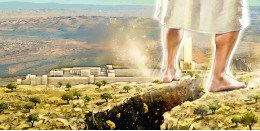 PMT 2015-139 by Kenneth L. Gentry, Jr.
PMT 2015-139 by Kenneth L. Gentry, Jr.
In my last article I began a two-part study on Zechariah 14. Having presented the dispensational view, I will now present a postmillennial interpretation of this famous passage.
The Siege of Jerusalem
The siege of Jerusalem described in Zechariah 14:1–2 points to the AD 70 judgment upon Jerusalem. J. Dwight Pentecost admits that the disciples who hear the Olivet Discourse would naturally apply Zechariah 14 to that event. But then, he says, such requires the confusing of God’s program for the church with that for Israel. So, he and other dispen-sationalists interpret the passage literalistically, with all the topographical and redemptive historical absurdities this creates. As they do this they totally omit any reference to the destruction of the very city and temple being rebuilt in Zechariah’s day. Yet this literal temple (the second temple) is destroyed in AD 70, as all agree.
Zechariah 14:1–2 pictures the Roman imperial forces joining the various client kings who engage the Jewish War AD 67–70. This war is conducted by an empire of “nations” (v 2), consisting not only of the Romans but the lands of Syria, Asia Minor, Palestine, Gaul, Egypt, Britain, and others. Client kings, such as Antiochus, Agrippa, Sohemus, Malchus, and Alexander, provide auxiliary forces for Rome during the Jewish War (J.W. 2:18:9; 3:4:2; 5:1:6). The consequences are disastrous: much of Israel’s population is either killed or led captive. D. A. Carson observes that never was “so high a percentage of a great city so thoroughly and painfully exterminated and enslaved as during the Fall of Jerusalem.” Yet the Lord defends those who are truly his people, insuring their escape from the besieged city (vv 3–4).
Great Tribulation: Past or Future?
(Thomas Ice v. Ken Gentry)
Debate book on the nature and timing of the great tribulation. Both sides thoroughly cover the evidence they deem necessary, then interact with each other.
See more study materials at: www.KennethGentry.com
The Lord will fight for his true people “as when he fought in the day of battle” (v 4). The Lord’s feet standing on the Mount of Olives and his fighting for his people need be no more literal than other references regarding the Lord’s fighting for Israel in the Old Testament. The language is similar to that in Joshua 10:14, 42 and 23:3, where the Lord “fought for Israel.” In Joshua these references indicate his providential favor in Israel’s victory and deliverance, not his corporeal presence. Prophecy often mentions God’s feet when his and Israel’s enemies are thwarted and are given success against all odds (Ps 18:9; Isa 60:13; Nah 1:3; Hab 3:5).
The Cleaving of Olivet
The cleaving of the Mount of Olives under him employs the common imagery of God’s conquering and restraining power in Old Testament prophecy. In Micah 1:3–4 we read that “the LORD is coming out of His place; He will come down and tread on the high places of the earth. The mountains will melt under him, and the valleys will split like wax before the fire, like waters poured down a steep place.” Even dispensationalists admit this speaks of the Old Testament subjugation of Israel under heathen nations for her sin. Mentioning the direction of the cleft “indicates the direction of their flight,” i.e., the Christians who flee Jerusalem when God judges it. They ultimately flee to all points of the compass, taking the gospel with them (cf. vv 8–9).
In the latter part of verse 5 the coming judgment upon Jerusalem, which disperses the Christians over the Roman Empire, is ultimately God’s coming in angelic judgment (“holy ones” are angels). Jerusalem’s destruction by Rome is providential destruction by “his armies” (Mt 22:7). It leads to darkness and woe upon Israel (Zec 14:6–7; cf. Ac 2:20, 22; Mt 24:29). Yet, as Jerusalem collapses and Christianity separates from her Jewish constraints, the waters of life begin flowing out into all the world (v 8; cp. Mt 24:14; Ac 1:8; 9:15). The Lord’s kingdom overflows Israel’s limited borders so that the he becomes the King of all the earth (v 9; Mt 28:18–19; Eph 1:20–21).
The subsequent topographical and liturgical references figuratively portray the ethical and spiritual changes that occur under Christ’s spir-itual administration as his worship spreads through the earth (vv 10ff). Even Jerusalem and the Jews shall be nourished by the waters of life eventually (vv 10–11; cf. Eze 47:1ff; Jn 7:38–39). The enemies of God’s people will either be vanquished (vv 12–13, 14), converted (vv 16, 20–21), or reduced to insignificance (vv 14, 17–19).
Getting the Message
(by Daniel Doriani)
Presents solid principles and clear examples of biblical interpretation.
See more study materials at: www.KennethGentry.com
The Feast of Tabernacles is mentioned, not as a literal reinstitution of the Old Testament feast, but as the ultimate hope pre-figured in that feast: the time of the full evangelical harvest (cf. Jn 4:35–38). Those who do not convert will be reduced to servile labors, lacking the blessing of God (vv 17–19).
Overall, however, the kingdom of God (represented here by a reju-venated Jerusalem, cp. Gal 4:25–26; Heb 12:22; Rev 21:2) will be spread throughout the earth. All areas of life will be consecrated to the Lord: even the horses’ bells will contain the inscription written on the High Priest’s miter (vv 20–21).








November 18, 2015
ZECHARIAH 14 IN POSTMILLENNIALISM (1)
 PMT 2015-138 by Kenneth L. Gentry, Jr.
PMT 2015-138 by Kenneth L. Gentry, Jr.
In Zechariah’s great prophecy we read one verse that is used by dispensational literalists to overthrow the prophet’s postmillennial hope. That verse reads:
“And in that day His feet will stand on the Mount of Olives, which faces Jerusalem on the east. And the Mount of Olives shall be split in two, from east to west, making a very large valley; half of the mountain shall move toward the north and half of it toward the south.” (Zech 14:14)
ZECHARIAH ESCHATOLOGICAL DEBATE
Zechariah has been called “the most messianic, the most truly apocalyptic and eschatological of all the writings of the Old Testament” (ISBE1, 4:3136.) And surely it is. But Zechariah is greatly misunderstood in dispensationalism. Dispensationalists hold that Zechariah 14 undermines non-dispensational views such as postmillennialism. I will summarize the view from Dallas Seminary’s Bible Knowledge Commentary and then give a brief postmillennial interpretation of the passage.
That dispensationalists believe this prophecy undermines postmillennialism is evident in the following comment:
Zechariah 14 progresses from the initial plundering of Jerusalem near the end of the future Tribulation, through the catastrophic judgment on the Gentile armies at Messiah’s Second Advent and the establishment of His millennial reign, to a description of the wor-ship in Jerusalem during the Millennium. The fact that these events have not yet occurred points to a premillennial return of Christ, that is, His return before the Millennium.
THE DISPENSATIONAL VIEW
Dispensationalists apply verse 1 to a great tribulation still in our future, which introduces the earthly millennial reign of Christ and comprises “the day of the Lord.” They see this verse as portraying the “military intervention of the Messiah,” with verse 4 detailing its accomplishment as the Lord descends upon the Mount of Olives (BKC 1:1570). Then he will establish his political kingdom over the earth, accompanied by “changes in illumination, climate, and topography which God will bring on Jerusalem, Palestine, and no doubt the whole earth during the Millennium” (1:1570). All of this arises from a literalistic reading of verses 6–11.
Israel in the Bible and History (Book) by Ken Gentry
A careful study of the biblical material defining the gift of tongues. Shows they were known languages that served to endorse the apostolic witness and point to the coming destruction of Jerusalem, after which they ceased.
See more study materials at: www.KennethGentry.com
Zechariah 14:12–15 supposedly is a “parenthetical flashback” describ-ing “the second phase of the invasion of Jerusalem by the confederated Gentile armies.” After this, “the survivors from all the nations will worship annually in Jerusalem. ‘The survivors’ are not the Jewish remnant. . . [but are those] from nonmilitary personnel of those nations whose armies were destroyed by Messiah” (BKC 1:1570, 1571).
Verses 16–17 speak of “a newly instituted worldwide religious order embracing both Jews and Gentiles” that will be established and “will center in Jerusalem and will incorporate some features identical with or similar to certain aspects of Old Testament worship.” Thus, “worshiping annually in Jerusalem will be necessary for the people to enjoy the fertility of crops” (BKC 1:1570, 1571).
This entire dispensational scheme is wholly out of accord with the flow of redemptive history, so much so that it has been called an “evangelical heresy” by Meredith G. Kline. Indeed, “A. A. Hodge, B. B. Warfield, and J. G Machen . . . were outspoken opponents of dispensationalism, which they considered close to heresy.” Non-premillennial evangelicals vigorously denounce this interpretation. As redemptive history progresses to “the last days” (Isa 2:2–4; 1Co 10:11; Heb 9:26), which Christ institutes in the first century as the “fullness of time” (Mk 1:14–15; Gal 4:4; Heb 1:1–2), the entire temple order and sacrificial system is forever done away with (Mt 24:1–34; Heb 8:13; Rev 11). Accompanying the physical temple’s removal, divine worship is forever de-centralized and universalized (Jn 4:21–23; Mt 28:18–20). In addition, God merges the redeemed of all nations into one kingdom without ethnic distinction (Ro 11:13–24; Eph 2:12–21; Gal 6:12–16; Rev 7:9–10). This very much contradicts dispensationalism’s reversing the divine economy back to an old covenant-like order, complete with the elevating of the Jewish race over all peoples.
Christmas Theology
21 mp3 Reformed messages on Christmas by Ken Gentry
Includes studies of images of Christ in manger scenes, consideration of the legitimacy of celebrating Christmas, Christmas miracles (incarnation, conception, and revelation), Christmas and the new creation, and more. Excellent for personal study or pastoral ideas.
See more study materials at: www.KennethGentry.com
Of course, a major problem with the dispensational viewpoint here in Zechariah 14 is it’s a priori interpretive literalism. The postmillennialist would interpret the passage in a much different light. The whole passage — as often with prophecy — is a mingling of literal and figurative prophetic allusions, as we shall see. In my next posting.









November 16, 2015
GOD’S WORD AND OUR HOPE
 PMT 2015-137 by Kenneth L. Gentry, Jr.
PMT 2015-137 by Kenneth L. Gentry, Jr.
We are postmillennialists not because our hearts long for a better world for our children. We are postmillennialists not because we judge from the progress of history that things are better today for Christianity than they were in the days of Nero. Rather we are postmillennialists because God’s word presents us with the hope of the conquest of the gospel in the world.
God’s word is creative, providential, prophetic, and restorative. History truly genuinely “his story.” God creates the world and man for his own glory (Ro 11:36; Rev 4:11).
The Scriptures teach that God controls history by the exercise of his almighty wisdom and power. In fact, the whole idea of predictive prophecy depends on this view of history, in that for any prophesied events to occur requires that all preceding and concurrently related events throughout the world and history must fall into place according to plan. Almost always (Christ and John Baptist being notable exceptions) the individual involved in the fulfillment of prophecy is unaware that his free action is fulfilling God’s prophecy.
Solid Ground (by Gabriel Fluhrer)
Insight and answers on: knowing God, the sufficiency of God’s Word, the truth of God, scripture alone, God’s word in the church, the accessibility of God’s Word, and the power of God’s Word.
See more study materials at: www.KennethGentry.com
Our sovereign God’s word is creatively constructive. That is, it brings reality into existence (Ge 1; Heb 11:3) and it directs all historical processes (Isa 46:10; 55:11). This two-fold reality of the creative and providential word links the authority of God’s word into human experience. The psalmist notes that the word of the Lord both sovereignly makes and providentially governs the heavens and the earth (Ps 33:6–11). He also notes that it is his creative and sovereign word that reveals to man righteousness and justice: “For the word of the Lord is upright; and all his work is done in faithfulness. He loves righteousness and justice” (Ps 33:4–5a). God’s word/command is the standard of right and wrong obligations, as it was in the garden of Eden.
Even Adam’s unfallen nature was not an ultimate moral standard, but a derivative one. As Cornelius Van Til teaches, Adam was receptively reconstructive of God’s word, rather than creatively constructive. He was to think God’s thoughts after him on the creaturely level. Even in his unfallen state, he knew that he was created to live by supernatural, positive revelation, not by autonomous self-direction. The method by which Adam knows good and evil is by obedience to God’s revelatory word.
Standard Bearer: Festschrift for Greg Bahnsen (ed. by Steve Schlissel)
Includes two chapters by Gentry on Revelation and theonomy.
See more study materials at: www.KennethGentry.com
Thus, as evangelical Christians we must hold firmly to the truthfulness of God’s word. We need to be like the first grade girl dealing with her unbelieving teacher: The little girl was in art period drawing a picture of Jonah being swallowed by a whale. Her teacher looked at the drawing and said: “Jonah could not have been swallowed by a whale and lived, it would have killed him.” The little girl insisted he was swallowed by a whale because the Bible said so. But the teacher gently kept informing the little girl of her error. In exasperation the little girl finally complained: “When I get to heaven I am going to ask Jonah if he was swallowed by a whale.” The teacher responded: “What if Jonah didn’t go to heaven?” The little girl quickly replied: “Well then you can ask him.”









November 13, 2015
WHITBY AND POSTMILLENNIALISM
 PMT 2015-136 by Kenneth L. Gentry, Jr.
PMT 2015-136 by Kenneth L. Gentry, Jr.
Most dispensationalists are quite confused regarding the origins of postmillennialism. Hal Lindsey as confidently declares its modern origins as he does the latest date for the Rapture: “There is no evidence of the distinctive teachings of Postmillennialism earlier than the seventeenth century.”
Charles Baker states: “Its advocates admit that it was first taught in the seventeenth century.” Many wrongly assume that we may trace postmillennialism back only as far as Daniel Whitby in 1703.
L. S Chafer alleged that Whitby was “the originator of what is known as postmillennialism.”
Mal Couch puts in the Bible notes of the Prophecy Study Bible: “This view was first propagated by Daniel Whitby (AD 1638–1726), a Unitarian.”
Postmillennialism Made Easy (by Ken Gentry)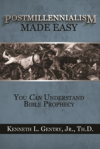
Basic introduction to postmillennialism. Presents the essence of the postmillennial argument and answers the leading objections. And all in a succinct, introductory fashion.
See more study materials at: www.KennethGentry.com
And this was Thomas Ice’s original view:
“Daniel Whitby first put forth his view in a popular work entitled Paraphrase and Commentary on the New Testament (1703). It was at the end of this work that he first set forth what he calls in his own words ‘A New Hypothesis’ on the millennial reign of Christ. Thus, the system called postmillennialism was born in the early 1700s as a hypothesis. Whitby and his modern followers present their arguments and explanations based upon unproved assumptions — assumptions resulting in a hypothesis rather than something which is the fruit of the study of Scripture or even the voice of the church.”
Fortunately Ice has come to recognize his error, for in a later work he acknowledges regarding the Whitby argument: “this does not mean that elements of systematic postmillennialism did not exist prior to Whitby, for they clearly did.”
Whitby was not the founder of postmillennialism — even of its more systematic, modern expression. Rodney Peterson writes that prior to Whitby “this perspective had undergone changes, particularly since Thomas Brightman (1562–1607).”
Saving Freedom
(by Sen. Jim DeMint)
(Former) Senator DeMint’s firsthand account of the unsettling socialist shift—behind-the-scenes actions in Congress that are changing the character of our nation.
See more study materials at: www.KennethGentry.com
Amillennialist Venema agrees. Brightman, who died in 1607, was one of the fathers of Presbyterianism in England. He sets forth his postmillennial views in detail in his book, A Revelation of the Revelation. In fact, many consider this work the “most important and influential English revision of the Reformed, Augustinian concept of the millennium,” “one of the most influential of the Puritan expositors of Revelation.” This was a century before Whitby’s 1703 article. Ball categorically denies Whitby’s foundational role. Whitby was simply not the “founder” of postmillennialism; he was a modern system-atizer. He was helpful in “popularizing” postmillennialism because he present postmillennialism’s “most influential formulation” to date.









November 11, 2015
“MUSLIMS ARE JUST SICK OF ISLAM”
 by Hazel Torres
by Hazel Torres
in Christianity Today (11/1/2015)
More and more Muslim refugees in UN camps in Iraq are embracing Jesus Christ and expressing repugnance of their former religion, Christian Aid Mission workers have disclosed.
“They’re just sick of Islam,” a Christian ministry leader in the Kurdish Region of Iraq recently told the Christian Aid Mission.
“People are very hungry to know about Christ, especially when they hear about miracles, healing, mercy and love,” he said, as reported in the Gospel Herald.
The ministry director, who declined to be identified for security reason, said the Muslims in their camp have witnessed the brutality of Islamic State (ISIS) militants carrying out beheadings and other horrific acts in the name of Allah.
The director said his ministry has been swamped with Iraqi Muslims seeking to know more about Christ and the Bible.
“As terrifying and horrifying as ISIS is, they did us a great favour because they came and have shown them all the killing, saying that it’s all in the Quran verses. So now we don’t have to say much, we just say the truth,” the director.
The Kurdish Region of Iraq hosts some 900,000 refugees, around 233,000 from Syria and the rest from Iraq, based on UN figures issued in January this year.
Christianity and the World Religions: An Introduction to the World’s Major Faiths
By Derek CooperCooper.
Examines the rival worldviews found in Hinduism, Buddhism, Confucianism and Taoism, Judaism, Islam, and irreligion. He engages these worldviews from a Christian perspective.
See more study materials: www.KennethGentry.com
The Christian ministry director said his organisation provides aid to displaced people living in tents and dilapidated or unfinished buildings inside the sprawling camp. Aside from shelter, the Muslim refugees are given food, blankets, heaters and even diapers for babies.
The Christian Aid Mission workers are also bringing copies of the Bible and distributing them to refugees who have expressed interest in knowing more about Jesus Christ and His teachings.
“We just help because we love them, and maybe the next time we visit we tell them about Jesus and give them Bibles,” the ministry director said. “We believe in the power of the Word of God. We don’t have many preachers. We don’t have many missionaries, but we have the Word of God that we’re able to print, purchase and deliver to the people and their children.”
He said there has been a great Christian “awakening” among the Muslims in the region, adding that he has personally witnessed many such conversions.
He recalled one incident when a Muslim receiving aid from his ministry was given a Bible, at first reluctantly.
World Religions and Cults
(Bodie Hodge, ed.)
This work is helpful for understanding and combating false religions and cults. It deals with the leading false religious beliefs in the world today.
See more study materials at: www.KennethGentry.com
“He said, ‘OK, but I’m Muslim, I can’t become Christian—I have a big family, and my father is a very extremist radical,'” the director said. “I said, ‘I didn’t ask you to be Christian. I’m not trying to change your religion here. I just want you to read the Bible and know who Jesus Christ is. I want you to have a relationship with God.'”
The Muslim agreed, and he began reading the Bible together with his wife and their children.
To finish this article: Muslims Sick of Islam








November 9, 2015
CARNIVOROUS EDEN?
 PMT 2015-134 by Kenneth L. Gentry, Jr.
PMT 2015-134 by Kenneth L. Gentry, Jr.
In some passages the kingdom of God is pictured in terms of Eden renewed, entailing peaceable conditions. In an earlier article, I pointed out that the animals prior to the Fall were not carnivorous (“Animal Death in Eden?” 7/7/14).
In that article I mentioned prophetic images picture animals living in peace as symbols of the eschatological victory of God’s kingdom. In our fallen world the lion’s deadly and terrifying power even serves as a proverbial image in the Old Testament (Num. 23:24; Psa. 7:2; 17:12; Prov. 19:12; 20:2; 28:15; Isa. 38:13). But gentle carnivores are images of the fulness of God’s kingdom. For instance, carnivores are seen living in harmony with herbivores, though herbivores are their natural prey in Moses’ and our post-fall world (Gen. 49:9, 27; Deut. 33:20; Psa. 104:21; Isa. 5:29; Nah. 2:12).
And in Isaiah 11:6–7 we read that “the wolf will dwell with the lamb, / And the leopard will lie down with the young goat, / And the calf and the young lion and the fatling together; / And a little boy will lead them. / Also the cow and the bear will graze, / Their young will lie down together, / And the lion will eat straw like the ox” (see also Isa 65:25). Prophecies of God’s victory often reflect pre-Fall, Edenic conditions (e.g. Eze. 36:35; 47:1–12; Isa. 51:3; Rev 2:7; 22:2).
If such images reflect the actual historical reality of Eden, then peaceable conditions prevailed in the pre-Fall world and were radically changed upon the Fall. The postmillennialist believes with the amillennialist that these images are pictures of the spiritual reality that prevails when men are redeemed by the Prince of Peace. However, the postmillennialist also sees this spiritual reality of peace among men as also gradually unfolding in history as the gospel takes root and spreads before the end.
Genesis and Creation (Set 1: Genesis 1).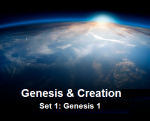
An in-depth sermon series on the opening chapters of the Bible from a Six-day Creationist perspective. Offers many insights into the reason Moses wrote the Creation Account, insights little recognized by the average Christian. This is set 1, which covers Genesis 1.
See more study materials at: www.KennethGentry.com
Many Christians committed to theistic evolution (necessarily) disagree with any original passivity of such beasts. For instance, Meredith Kline, for instance, argues that “Psalm 104:21 seems to indicate clearly that the Creator had from the outset granted to predatory beasts to feed on other animals.” That verse reads: “The young lions roar after their prey /And seek their food from God.” But this does not speak of the lion’s original behavior. It is speaking in the present, and highlighting God’s governance of all of life in that “the earth is full of Your possessions” (Psa. 104:24c). Neither does Psalm 104:26a imply of the seas in creation week that “there the ships move along.”
Kline also points to 1 Timothy 4:3–4 as evidence for animal death from the beginning of creation: “false teachers who were forbidding some of them to marry and others forbidden to eat various kinds of foods and meats. Paul says it’s all wrong thinking here, because, God made these things, all of them to be received with thanksgiving. They’re all good. So, here’s the language of God’s intention from the beginning in creating them.” There Paul states: “men who forbid marriage and advocate abstaining from foods which God has created to be gratefully shared in by those who believe and know the truth. For everything created by God is good, and nothing is to be rejected if it is received with gratitude.”
How shall we reply?
Paul is dealing with Gnostics who believe the material realm is in itself evil. As the Dictionary of Paul and His Letters (DPL 661) notes regarding the mission works of Timothy and Titus: “They were increasingly endangered by a judaizing-gnostic countermission (1 Tim 1:3–7, 19–20; 4:1–2; 6:20; 2 Tim 4:3–4; Tit 1:10–16) . . . that included church leaders and probably former co-workers (2 Tim 1:15–18; 2:16–17; 3:6–9; 4:10; Tit 3:9–14).” An “essential feature of Gnosticism” was “an opposition between the spiritual world and the evil, material world” (DPL 350), which led them to abstain from meat as a feature of their “gnostic asceticism” (DPL 353).Paul’s fundamental point against these false teachers is that “everything created by God is good” (1 Tim. 4:4a). Yet the Gnostics are declaring certain foods to be evil in themselves — despite the fact that God created them.
Exclusive Psalmody
(4 mp3 sermons by Ken Gentry)
One sermon defends reverent, biblical hymnody; three sermon series critiquing the Exclusive Psalmody position. Defends reverent hymnody while affirming the glory of Psalm singing.
See more study materials at: www.KennethGentry.com
Interestingly, in 1 Timothy 4:3a Paul uses the generic word “food” (br ma) rather than the specific word for “meat” (kreas, “flesh”). Consequently, he is referring to “foods which God has created to be gratefully shared in” (1 Tim. 4:3b). Clearly he is not declaring all God-created foods to be always received and “gratefully shared in” throughout all times from the beginning of time. After all, Adam was forbidden to partake of the fruit of the tree of the knowledge of good and evil (Gen. 2:15–17; 3:11). Though it was food that God created (Gen. 1:11; 3:6), it could not be taken and “gratefully shared in.”
Nor could faithful saints under the old covenant partake of unclean animals (Lev. 11:4ff; Deut. 14:7ff; Acts 10:14). Though God created them, they could not be taken and “gratefully shared in.” And though in Paul’s context regarding eating, he declares that “everything created by God is good,” surely he does not allow for cannibalism to supply food to be “gratefully shared in.”
Calvin notes that in 1 Timothy 4, the “creatures are called pure not just because they are God’s works, but because they are given to us with His blessing. We must always have regard to God’s appointment, both what He commands and what He forbids.” After all, our food “is sanctified by means of the word of God and prayer” (1 Tim. 4:5). This requires a directive from God (through his word) along with prayer. In fact, God does not allow man to eat meat until after he establishes his covenant with Noah: “Every moving thing that is alive shall be food for you; I give all to you, as I gave the green plant” (Gen. 9:3). So likewise, before the Fall man was directed only to eat vegetation (Gen. 1:29) — which could be taken and “gratefully shared in.”
I do not believe that Adam and Eve crept through the Garden of Eden, singing “Lions, and tigers, and bears! Oh my!” Nor do I believe that God’s people will always endure enmity in the earth which is the Lord’s. As this blog shows in many ways, we may rightly expect the eventual victory of God’s kingdom in the world.








November 6, 2015
POSTMILLENNIALISM AND PERSECUTION
 PMT 2015-133 by Kenneth L. Gentry, Jr.
PMT 2015-133 by Kenneth L. Gentry, Jr.
Quite frequenty critics of postmillennialism will go to NT passages such as Matt 10:22 to discredit postmillennialism’s long-term optimism. That passage reads:
“You will be hated by all because of My name, but it is the one who has endured to the end who will be saved.”
Since postmillennialism expects a future in which Christianity reigns supreme, and in which righteousness and peace will prevail throughout the world, texts such as this one must be explained. Postmillennialism cannot be true if Christians will always be hated and the only hope we have is our bare endurance.
But does this passage teach such? I do not believe that it does. We must read the verse in its context to grasp what our Lord is actually declaring.
In Matt 10 Jesus appoints his disciples as apostles, investing them with great authority (Matt 10:1–2). And at this stage of his ministry he limits their outreach to Israel alone: “These twelve Jesus sent out after instructing them: ‘Do not go in the way of the Gentiles, and do not enter any city of the Samaritans; but rather go to the lost sheep of the house of Israel’” (Matt 10:5–6). Of course, this is not the way it was always to be, for later at the end of his ministry he commissions his church to “make disciples of all the nations” (Matt 28:19).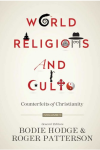
World Religions and Cults (Bodie Hodge, ed.)
This work is helpful for understanding and combating false religions and cults. It deals with the leading false religious beliefs in the world today.
See more study materials at: www.KennethGentry.com
Furthermore, immediately after his limiting their mission to Israel, he teaches them what they are to preach: “And as you go, preach, saying, ‘The kingdom of heaven is at hand’” (Matt 10:7). This also shows the early phase of his ministry. The kingdom has not yet come, though it is close at hand.
He then directs them to go from city-to-city in Israel to preach the gospel, heal the sick, cast out demons, and so forth (Matt 10:8–15). He notes that he is sending them “as sheep in the midst of wolves” (Matt 10:16). And in doing so he warns them: “But beware of men, for they will hand you over to the courts and scourge you in their synagogues; and you will even be brought before governors and kings for My sake, as a testimony to them and to the Gentiles” (Matt 10:17–18). This clearly speaks of their ministry to Israel, for it mentions the trouble they will experience from the synagogues.
He further warns that “brother will betray brother to death, and a father his child; and children will rise up against parents and cause them to be put to death” (Matt 10:21). Then we read the verse that raised our question: “You will be hated by all because of My name, but it is the one who has endured to the end who will be saved” (Matt 10:22).
Amillennialism v. Postmillennialism Debate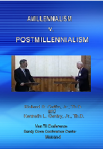
(DVD by Gentry and Gaffin)
Formal, public debate between Dr. Richard Gaffin (Westminster Theological Seminary)
and Kenneth Gentry at the Van Til Conference in Maryland.
See more study materials at: www.KennethGentry.com
Then following this warning he promises: “But whenever they persecute you in one city, flee to the next; for truly I say to you, you will not finish going through the cities of Israel until the Son of Man comes” (Matt 10:23). We must ask: “Whenever who persecutes you?” Contextually, it is speaking expressly of Jewish opposition.
What Matt 10:22 is declaring then is that as his twelve disciples (who are all dead by now!) engage the mission to Israel, they must hang tough, they must endure through the raging of Israel against Christ and his followers. Not only so, but he promises he will come in judgment against Israel before they have finished going through all the cities of Israel. This refers to the AD 70 destruction of Jerusalem and the temple, the specific “end” in view.
A similar statement to Matt 10:22 is found in Matt 24:13: “But the one who endures to the end, he will be saved.” And again, the context points to the time preceding the fall of Jerusalem, for he is answering a question about the coming destruction of the temple (Matt 24:2–3).
Thus, Matt 10:22 (and Matt 24:13) do not speak of relentless persecution to the end of history (are you persecuted to death?). Rather it is referring to Jewish persecution of the Christian faith that leads up to AD 70.









November 4, 2015
DOES REV 3:10 SPEAK OF THE RAPTURE?
PMT 2015-132 by Kenneth L. Gentry, Jr.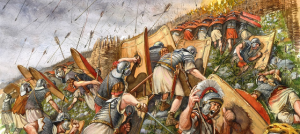
In Rev 3:10 we read of Christ’s statement the church at Philadelphia (not the church in Cleveland or Detroit!): Because you have kept the word of My perseverance, I also will keep you from the hour of testing, that hour which is about to come upon the whole world, to test those who dwell on the earth (3:10).
Because they are enduring for Christ—against all opposition, but especially from the Jews (3:9a)—he promises: “I also will keep you from the hour of testing” (3:10b). Since they kept (eteresas) his word, he will keep (tereso ) them becaus he blesses those who honor him. He will keep them from an hour of testing.
But how does he keep them from this dreaded hour? Does he take them out before the testing period, so that they might escape it altogether? Dispensationalists see this as an allusion to their pretribulational rapture (John F. Walvoord; Charles C. Ryrie; Robert L. Thomas). Or does he promise to uphold them through that period of testing? Though grammatically both interpretations are possible, the second one has more merit, for the following reasons.
First, it fits the context of the oracle which praises their past perseverance under trial: “you have kept the word of My perseverance.” Thus, the meaning appears to be: “You have endured thus far; I will carry you the rest of the way.”
Second, elsewhere in Revelation, the saints are called to endure through the storms they face (1:3, 9; 2:2–3, 10, 17, 19, 25–26; 3:3, 5, 8, 12, 21 12:11; 13:10; 14:4–5; 16:16; 17:14; 21:7). Why would they be promised escape from the trials here? In 7:14 we see the saints coming through “the great tribulation” with their robes washed in the Lamb’s blood. In 12:6, 14–17 we see them personally fleeing the wrath of Satan.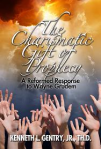
Charismatic Gift of Prophecy
(by Kenneth Gentry)
A rebuttal to charismatic arguments for the gift of prophecy continuing in the church today. Demonstrates that all revelatory gifts have ceased as of the conclusion of the Apostolic era.
See more study materials at: www.KennethGentry.com
Third, we might expect a clearer statement here to assure them that he meant something different from the whole movement of Revelation. For instance, we might expect a promise that he would “catch” them up (haparzo) from the world, such as in 1 Thessalonians 4:17. After all, Revelation uses this word for Christ who is taken out of the world at his ascension (12:5). Or he could have used the word “take up” (hupolamban ) as in Acts 1:9.
Fourth, the rapture view undermines the reason for their blessing. Just two verses later in 3:12, Christ promises certain blessings to “he who overcomes.” But according to the rapture view, they do not need to overcome, for they will escape the coming trial.
Fifth, in the next verse he declares that he is “coming quickly” and urges them to “hold fast what you have” (3:11b). This strongly suggests that they will have to endure the “hour of testing,” so that they not lose what they have.
Four Views on the Book of Revelation
(ed. by Marvin Pate)
Helpful presentation of four approaches to Revelation. Ken Gentry writes the chapter on the preterist approach to Revelation, which provides a 50 page survey of Revelation .
See more study materials at: www.KennethGentry.com
Six, throughout Revelation, Christ commands the saints to endure (see point 1). Significantly, in his high priestly prayer Jesus uses the same words when praying for his saints—to remain in the world. “I do not ask You to take them out of the world, but to keep them from [teres . . . ek tou ponerou] the evil one” (Jn 17:15; cp. terseo ek tes horas). Indeed, this was Christ’s own personal practice, as he prays before his death: “My soul has become troubled; and what shall I say, ‘Father, save Me from this hour’? But for this purpose I came to this hour” (Jn 12:27).
Of course, this whole encouragement and promise is not limited to the Philadelphia Christians. It will apply to all those in the churches if they remain faithful: “He who has an ear, let him hear what the Spirit says to the churches” (3:13).
Thus, there seems to be no reason to assume a pre-tribulation rapture in Rev 3:10. Just as there seem to be no reasons for dispensationalism at all.
Special offer: For a free, downloadable, mp3 sermon on why we worship on the first day of the week rather than the seventh day, see: Why We Worship on the First Day








November 2, 2015
LUKE V. LITERALISM
 PMT 2015-131 by Kenneth L. Gentry, Jr.
PMT 2015-131 by Kenneth L. Gentry, Jr.
Populist dispensationalism is heavily committed to a literalistic hermeneutic. (I do not mean that literally, however: how could an intellectual commitment to a hermeneutic construct be “heavy”? Unless, of course, it is presented in a big book containing either a large number of pages or a small number of extraordinarily thick sheets of paper. But I digress.).
Many dispensationalists argue for a literalistic hermeneutic based on Christ’s first coming. They state that since his first coming was a literal fulfillment of OT prophesy it serves as evidence that all OT prophecy should be interpreted literally. But when we look into the NT, we find that it can present Christ and his enthronement in a spiritual sense, as well. This undercuts the literalism argument in that it shows that prophecies regarding Christ’s first coming are not always and invariably literalistic.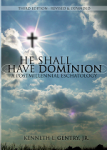
(paperback by Kenneth Gentry)
A classic, thorough explanation and defense of postmillennialism (600+ pages). Complete with several chapters answering specific objections.
See more study materials at: www.KennethGentry.com
For instance, in Acts 2 we find a classic and eschatologically relevant spiritual fulfillment of the OT in the apostolic era. Peter interprets the Davidic kingdom prophecies in general (Ac 2:30) and Psalms 16:8–11 (Ac 2:25–28) and 110:1 (Ac 2:34–35) specifically as being fulfilled in Christ’s ascension and session:
Therefore, being a prophet, and knowing that God had sworn with an oath to him that of the fruit of his body, according to the flesh, He would raise up the Christ to sit on his throne, he, foreseeing this, spoke concerning the resurrection of the Christ, that His soul was not left in Hades, nor did His flesh see corruption. This Jesus God has raised up, of which we are all witnesses. Therefore being exalted to the right hand of God, and having received from the Father the promise of the Holy Spirit, He poured out this which you now see and hear. (Ac 2:30–33)
Here Peter declares that David prophesied the enthronement of Christ when he spoke of his resurrection. The resurrection of Christ begins his state of exaltation, which ends his earthly state of humiliation. And it is the beginning of his kingly enthronement. From Pentecost until the end of history Christ is enthroned and reigning as a king. Jesus is not awaiting a future, literal enthronement in a dispensational millennium. [1]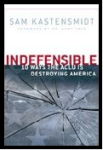
Indefensible (by Sam Kastensmidt)
Sub-title: 10 Ways the ACLU is Destroying America. An Important work in our day of cultural collapse and Christian persecution.
See more study materials at: www.KennethGentry.com
This is the standard exposition of non-premillennial covenant theologians (e.g., Robertson, The Christ of the Covenants, 220–21), as well as non-dispensationalist premillennialists and progressive dispensationalists (e.g., Ladd, Theology of the New Testament, 344).
Later, Paul preaches that Christ’s resurrection fulfills David’s promise to Israel: “And we declare to you glad tidings; that promise which was made to the fathers. God has fulfilled this for us their children, in that He has raised up Jesus. As it is also written in the second Psalm: ‘You are My Son, today I have begotten You.’ And that He raised Him from the dead, no more to return to corruption, He has spoken thus: ‘I will give you the sure mercies of David’” (Ac 13:32–34).
Literalism has difficulties in the kingdom preaching passages in Acts.
Special note
For an important, free, downloadable mp3 sermon on Genesis 2:4-ff click here: What Is the Message of Genesis 2? In this message I show that more was told to Israel of the Creation than we find in Genesis 1 and 2, pointing out that the Creation Account is necessarily a summary account. I also point out that Moses has a moral reason for presenting the Creation account; he is not providing it simply for Israel’s interest. Then I show that Genesis 2:4 is the heading of the following section so that it structurally links Genesis 2 with Genesis 1 and begins the redemptive story of the rest of Genesis and all of Scripture. If liberalism’s attack on Genesis 2 has alarmed you, I recommend listening.
Footnote
As an aside, this passage in Acts 2 led me out of dispensationalism while I was enrolled in Grace Theological Seminary in Winona Lake, Indiana. When I came upon this passage in my research for a class paper, I was startled to see Peter’s point. Not long after this discovery, I left Grace Theological Seminary and transferred to Reformed Theological Seminary in Jackson, Mississippi. There I studied under Greg L. Bahnsen and was startled one more time: this time by his strong affirmation of postmillennialism.









October 30, 2015
AD 70, ANTICIPATION, AND ADVENT
 PMT 2014:026 by Kenneth L. Gentry, Jr.
PMT 2014:026 by Kenneth L. Gentry, Jr.
AD 70 prefigures the Second Advent; it is theologically linked to it. But this does not imply any concept of double-fulfillment. There is a fundamental difference between prolepsis and double-fulfillment. Let me explain.
In the OT we have several “Day of the Lord” events: against Babylon (Isa 13:9), Jerusalem (Joel 2:1), and others. Each of these is a pointer to the final Day of the Lord (2 Pet 3:10), though each OT version is spoken of as THE (singular) Day of the Lord. This is much like our spiritual resurrection in salvation (John 5:24-25; 1 John 3:14) pointing to our final resurrection at the end of history. Or like the Christian’s being a “new creation” (2 Cor 5:17; Gal 6:15), which is a picture of the consummate new creation (2 Pet 3:10).
These observations represent standard proleptic theology, which is often called: Now-But-Not-Yet theology. This is held by most evangelical theologians.
In fact, many scholars see AD 70 as a microcosm of the final judgment. Consequently, we may expect the same imagery to apply to both AD 70 and the end.
For instance, of those first-century events, Bloesch states: “The catastrophe that befell the Jewish people in A.D. 70 is a sign of the final judgment.” (Donald G. Bloesch, The Last Things: Resurrection, Judgment, Glory [Downers Grove, Ill: InterVarsity, 2004], 84.)
(by Daniel Doriani)
Presents solid principles and clear examples of biblical interpretation.
See more study materials at: www.KennethGentry.com
Morris agrees: “a theological unity between the two judgments, and that some of what Jesus says [in the Olivet Discourse] could apply equally well to both.” (Leon Morris, The Gospel according to Matthew [Grand Rapids: Eerdmans, 1992], 593.)
Mounce concurs: “the coming destruction of Jerusalem was anticipation of the end of the age.” (Robert H. Mounce, Matthew [Peabody, Mass.: 1991], 222.)
Hagner writes: “The fall of Jerusalem is described in quasi-eschatological language and in the same discourse that describes the coming of the Son of Man. The two events are obviously linked in the minds of the disciples (as their question implied, 24.3) and very probably in the mind of the evangelist.” He continues: “There is a theological relationship between the fall of Jerusalem and the end of the age, since both involve judgment. . . . The former is the prefiguration of the latter.” (Thomas E. Schmidt and Moises Silva, To Tell the Mystery: Essays on New Testament Eschatology in Honor of Robert H. Gundry [Sheffield, Eng.: Continuum, 1994], 66.)
Reymond speaks of Christ’s “‘lesser (typical) coming in judgment’ in the destruction of Jerusalem in A.D. 70.” (Robert L. Reymond, A New Systematic Theology [Nashville: Nelson, 1998], 215.)
Alexander calls AD 70 a “prefiguring,”Robertson “a symbol” of the end. (Joseph Addison Alexander, The Gospel according to Matthew Explained [Lynchburg, Vir.: James Family, rep. n.d., (1861]), 345.)
Greatness of the Great Commission (by Ken Gentry)
An insightful analysis of the full implications of the great commission. Impacts postmillennialism as well as the whole Christian worldview.
See more study materials at: www.KennethGentry.com
Of AD 70, T. J. Geddert states: “the events were, as do so many events in the OT, to point toward the final judgment.” (in Michael B. Green, Scot McKnight, I. Howard Marshal, eds., Dictionary of Jesus and the Gospels: A Compendium of Contemporary Biblical Scholarship [Downers Grove, Ill: InterVarsity, 1992], 23.)
Bavinck sees AD 70 as “the announcement and preparation of the consummation of the world.” (Herman Bavinck, The Last Things: Hope for This World and the Next, trans. by John Vriend, ed. by John Bolt [Grand Rapids: Baker, 1996], 108.)
Strimple as “a proleptic, typological fulfillment of that final judgment of God.” (Robert B. Strimple in Darrell L. Bock, Three Views on the Millennium and Beyond [Grand Rapids: Zondervan, 1999], 64).
In fact, DBI observes that “Scripture portrays God’s judgments throughout history as proleptic pictures of the final judgment.” (Leland Ryken, James C. Wilhoit, Tremper Longman III, eds., Dictionary of Biblical Imagery [Downers Grove, Ill: InterVarsity, 1998], 472.)









Kenneth L. Gentry Jr.'s Blog
- Kenneth L. Gentry Jr.'s profile
- 85 followers



